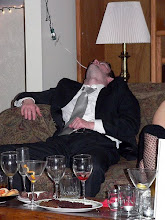
Way back in May, I prophesied, falsely, it now seems, that Juliet’s final act would simply have caused “The Incident,” the very thing Jack was aiming to prevent. The show’s insistence on keeping up with the Sideways Universe now pretty much shoots that theory all to hell. I think I shouted “WHAT?” at my laptop screen a half a dozen times through the run of “LAX.”
I find the whole development disappointing, and not just because I was wrong. Alternate realities are a convenient cheat of time travel stories, and in a show that has blathered on incessantly about destiny and fate since day one, having their ultimate fate sidelined by a big ol’ bomb seems counter-intuitive. I’ll wait to see what happens next. “The Substitute” offered us two versions of the John Locke we’ve been following for five years, but neither one was actually him.
The stakes, admittedly, are somewhat different. Take Back to the Future 2 as an example here. Biff Tannen rewrites history by giving himself-in-the-past a sports almanac. Woohoo gambling money. The universe’s rules haven’t changed, only the sequence of events. In “LAX” however, we already get clues that this isn’t the case. We see Desmond on the plane and, in a key line, Hurley tells Sawyer “I’m the luckiest guy in the world.” My guess is, Tricia Tanaka ain’t dead, neither. And, as was pointed out to me, in the original pilot it’s Jack who reassures Rose and not the other way around, as in “LAX.”
And, in the big whopper last Tuesday’s “Lighthouse,” we learn that this Jack has a son. A piano prodigy, by the way, the same way as Daniel Faraday was. I don’t know how or if that’s significant, as the parade of Island-dwellers now transplanted to 2004 LA continues, I’m really not sure what the hell is going on. Over at Medialoper, blogger Jim Connelly’s theory is that the two realities are going to start to bleed together, a theory backed up a bit here by Alterna-Jack not knowing where he got his appendix scar, something it turns out he’s had for years.
Bringing the two paths together seems inevitable, especially for making the drama of these “new” characters work. But what does it prove? “Lighthouse” was besprent with mirror imagery, and not just in its eponymous never-before-seen tower. What does seeing how their lives might have been give us? What’s the point? From the beginning the show has been about duality, and this seems to be an outgrowth of that, but, really, does having these two opposites bleeding in to eachother undermine that duality? What are we left with?
PS: The image at the beginning if this post is from a fabulous collection of fan-made Season 6 posters by Mattson Creative
PPS: Alterna-Jack should totally grow a goatee.










